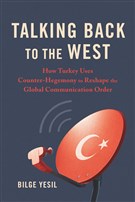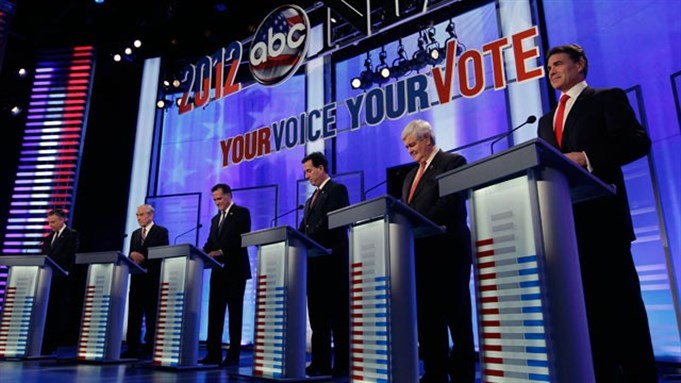On 3 June, while mass protests against the Justice and Development Party (AKP) government were raging in several cities around Turkey, something equally important happened in Istanbul. Close to three thousand people gathered in front of the offices of Dogus Media Group, one of the five largest media conglomerates in Turkey. Waving paper money in their hands and holding up posters with the image of the three wise monkeys, they chanted “sell-out media.” In an ironic twist, NTV, Dogus Media’s flagship news channel, went live and began broadcasting the very demonstration taking place at its doorstep. “They are protesting the attitude of the media. They are protesting us,” the NTV presenter said.
Though the immediate target of the protest was NTV and Dogus Media Group for their scant coverage of the massive anti-government demonstrations, the discontent was with Turkish news media in general. Mainstream news channels (e.g., NTV, CNNTurk, HaberTurk) had turned a blind eye to the protestors and the police violence aimed at them. As thousands were attacked by tear gas and water cannons in Istanbul’s Taksim Square, NTV had chosen to continue with its regular programming: the weather forecast and sports coverage. While thousands of people were flocking from various neighborhoods to Taksim Square to support the protestors, either by crossing the Bosphorus Bridge or walking along the highway, CNNTurk was broadcasting a documentary on penguins. As protests and clashes intensified, the prime minister went on HaberTurk for a live interview in which Fatih Altayli, one of the top news producers at the channel, acted more like a facilitator of government propaganda than as a journalist.
The blackout on news channels as well as on other television outlets is outrageous, but not surprising. Turkish media is marked by high levels of clientelism, especially since the early 1990s when rapid and unabashed liberalization transmuted ownership from media professionals to capitalist entrepreneurs. Today, five large conglomerates, with business interests in non-media related fields, own most of Turkish media. Dogan Group (owner of CNNTurk) has companies in the financial, trade, and tourism sectors, while Dogus Group (owner of NTV), Ciner Holding (owner of HaberTurk), Calik Holding, and Cukurova Group all have commercial interests in the textile, energy, construction, finance, telecommunications, mining, automobile, and tourism sectors. As a matter of fact, none of these conglomerates started out as media companies. Instead, they purchased media outlets after they established themselves in other sectors, and acquired enough capital to enter the media sector. In turn, they used media as a “bargaining tool” with the government for contracts, subsidies, and privatization deals. Their dependence on government licenses to conduct business in these sectors makes them extremely vulnerable to financial pressures, and aggravates the problems of self-censorship and instrumentalization of reporting—as illustrated this week.
Though clientelism is not limited to the AKP government and its cronies, and had plagued their predecessors since the early 1990s, it has obviously intensified under AKP rule. Take for example the conflict between the AKP government and Dogan Media Group. In 2009, the Ministry of Finance levied a total of four billion USD in tax charges against Dogan Media, which nearly equaled the total value of the company’s assets. The AKP maintained that the charges were related to tax irregularities, and that it had no other motive. However, because Dogan’s editors had criticized the AKP government, many considered this tax fine as a way to silence criticism. Dogan Media buckled under pressure and fired some of its most critical voices from its mainstream newspapers to appease the AKP, and save itself in the face of the enormous tax fines.
The AKP government not only silenced its critics but also created its own partisan media. In 2007, it seized control of ATV-Sabah, a joint television-newspaper ownership, citing corruption charges, and then facilitated its sale to the AKP–friendly Calik Holding. That the prime minister’s son-in-law is Calik Holding’s CEO, and the sale was financed by two state-owned Turkish banks, confirmed the claims that the AKP was developing its own loyal media.
The problems of clientelism, self-censorship, and instrumentalization of reporting are not unique to Turkey. However, their effects are amplified because of the restrictive legal framework, as evinced in the wiretapping, prosecution, and imprisonment of journalists, the criminalization of Kurdish news outlets, the imposition of penalties on television channels by the Radio and Television Supreme Board (RTUK), the strict regulation of film and music production by the Ministry of Culture, and the censorship of online communications through website blockings and content filtering.
Though Turkish media has been plagued by legal barriers and commercial pressures for decades, under AKP rule, the relationship between media and the state has worsened. Over the last couple of years, dozens of journalists have been stamped as “terrorists” or “extremists” under a wide array of “crimes” that range from Kurdish propaganda to attempting to overthrow the government. At the same time, others have lost their jobs because of the political and economic alliances between media owners and the government. Self-censorship has become normalized, critical voices have been silenced, and media culture has been narrowed.
In this environment, the scant coverage of recent events is not surprising given the fear of government reprisal. But its effects have been detrimental. Given the lack of credible news, many Turks, at least those with Internet connection, turned to social media to keep themselves informed. Facebook and Twitter have served not only as the main channels of communication among the protestors, but also as the key source of news. Not surprisingly, Prime Minister Erdogan labeled Twitter as a “menace” to society, and in a matter of a few days, Turkish police began to detain Twitter users on charges of “inciting the public to violence and revolt.” The number of those detained on such charges has now reached fifty people.
This past week, the discontent with mainstream news media has been so high that Birsen Altayli, a Turkish reporter for Reuters, instantly became a hero after posing a challenging question to Prime Minister Erdogan. In the meantime, under continued pressure from the public, Dogus Media Group CEO Cem Aydin apologized to NTV employees for betraying their audience and promised to win back their trust. We shall wait and see.
![[Protetors in front of Dogus Media. Image by Gazeteport]](https://kms.jadaliyya.com/Images/357x383xo/ProtestorsinfrontofDogusMedia_imagecreditGazeteport.JPG)















